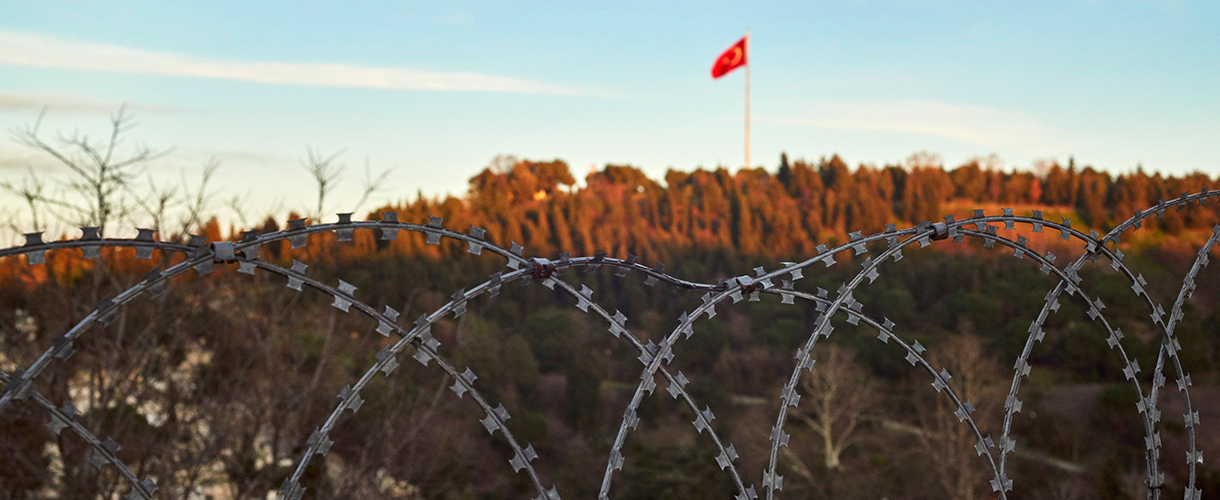
Support for Extremism
Under President Erdogan and the Justice and Development Party (AKP), Turkey has hosted a slew of Islamist groups, some of which are designated terrorist organizations, and allowed them the freedom to operate within Turkey’s borders. This alliance with extremist groups is not incidental but a part of the AKP’s character: Erdogan and the AKP are committed islamists with a dim view of religious minorities.
Political Islamism in Istanbul
During the AKP’s two decades in power, Istanbul has undergone a dramatic transformation, becoming the primary hub for exiled Islamic extremist groups. Though Istanbul’s cosmopolitan, multi-religious heritage and Turkey’s tradition of secularism have traditionally kept extremism at bay, under Erdogan such groups have gained confidence and become more active.
After the military coup that ousted Muslim Brotherhood member Mohammad Morsi from the Egyptian Presidency, Erdogan became Egypt’s most vocal critic. Erdogan also began accepting Muslim Brotherhood members into Turkey. According to Carnegie Middle East Center fellow Mohanad Hage Ali, “Istanbul is certainly now the Muslim Brotherhood hub, but there are also so many other Arab political streams present in the city.” The Muslim Brotherhood has now opened up a TV station and broadcast from Turkey—and the Turkish government has only recently suppressed it, not for its religious extremism but for its criticism of the Egyptian regime.
Turkey is also a primary hub of Hamas, providing key support and shelter for some of its most important members. In 2019, the Israeli diplomatic mission to Turkey warned Ankara that Hamas was committing terrorist activity within Istanbul, but the Turkish government took no action. In 2020, the Turkish president personally hosted Hamas chief Ismail Haniyeh and other prominent officials in Istanbul for talks. Moreover, Turkey has provided key Hamas members with Turkish citizenship and passports.
The Turkish-Syrian Border
Syrian jihadist organizations have benefitted from Turkish impunity and support toward extremism. There is a wide range of Syrian jihadist groups, and Turkish support for them ranges from oblique to direct. In 2014, Turkish journalist Can Dundar reported on a weapons shipment being sent to Syria in order to arm jihadist groups fighting against the regime of Bashar Al-Asaad. The weapons, according to Dundar, were being shipped by the Turkish secret service (MIT). Dundar was imprisoned and exiled for his reporting.
Turkey is less secretive now than in the past about its support for Syrian jihadist groups. Its porous border policies have allowed jihadist groups to move in and out of Turkey while fighting against their enemies in Syria, particularly the Kurds. Groups such as ISIS and Al-Nusra Front are able to use Turkey as a base, and the Turkish border with Syria has been the crossing point at which jihadist groups would welcome new recruits. According to former Director of Intelligence James R. Clapper Jr, “Turkey’s primary interest in Syria was keeping Kurds at bay, not stopping the rising menace of well-armed jihadist groups.”
The effect of supporting such dangerous and well-armed groups has been devastating for the citizens of Turkey, as ISIS has extended its anti-Kurdish campaign to within Turkish borders.
In July 2015, a suicide bomber killed 32 Turkish citizens, mainly Kurds, who were gathered in Suruc to provide support for Syrian war victims across the border. The Kurdistan Workers Party (PKK) subsequently blamed Turkey for creating the conditions for this attack, and within days war between the PKK and Turkey resumed, breaking a temporary ceasefire. In October 2015, Turkey experienced its deadliest-ever terrorist attack when a suicide bomber killed 109 people and wounded over 250, the vast majority of whom were Kurds attending a Peoples Democratic Party (HDP) rally in support of ending the war between the PKK and Turkey.
ISIS has also menaced the local population, especially Kurds, in border cities like Gaziantep. In the summer of 2016, ISIS attacked a Kurdish wedding procession in revenge for Kurdish gains on the battlefield. Yazidi slave markets have also twice been uncovered in Gaziantep, many of which traffic sex slaves captured during the genocidal 2014 ISIS campaign in Mount Sinjar.